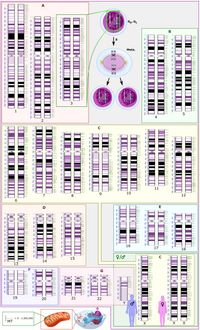
Photo from wikipedia
10602 Background: As the use of circulating tumor DNA (ctDNA) is more widely implemented, incidental identification of pathogenic variants reflecting germline alterations in cancer predisposition genes will occur more frequently.… Click to show full abstract
10602 Background: As the use of circulating tumor DNA (ctDNA) is more widely implemented, incidental identification of pathogenic variants reflecting germline alterations in cancer predisposition genes will occur more frequently. Such mutations are expected to have a high mutant allele frequency (MAF) or occur in genes typically associated with inherited syndromes. When a similar analysis was conducted by our group, we found that MAF of about 30% or greater in BRCA1/ 2 was associated with confirmed putative germline mutations in patients with breast cancer (Jacob et al & Davis et al, SABCS 2020). In this study, we extended this analysis to non-breast malignancies. Methods: Patients with non-breast solid malignancies and ctDNA testing between 2015-2020 were retrospectively identified from Northwestern Medicine. All ctDNA was analyzed using Guardant 360 (Guardant Health, Inc. Redwood City, Ca). Patients with ctDNA samples with mutations at high MAF (>30%) and those with BRCA1/2 mutations at any MAF were identified. We reviewed these charts for referral to genetic counselors and/or CLIA-approved germline testing. Descriptive analysis was reported for these findings. Genetic alterations were classified as pathogenic or of unknown significance based on OncoKB (Chakravarty et al, JCO PO 2017). Results: We identified ctDNA samples of 548 patients with non-breast solid malignancies, of whom 56 had gene mutations occurring at high MAF (>30%). Predominant cancer subtypes were lung (48%), colorectal (21%), pancreatic (7%), ovarian (3.5%), prostate (3.5%), and gastroesophageal (3.5%). The most common gene mutations identified were TP53 (46%), BRCA1/2 (18%), EGFR (18%), APC (13%), and KRAS (9%). 87.5% were pathogenic and 12.5% were of unknown significance. 11 patients (19.6%) had germline testing of whom 6 tested positive. These germline mutations were in BRCA2 (n = 3), EGFR, APC, and TP53. In addition to the 10 patients with BRCA1/2 mutations at high MAF (>30%), we identified 70 patients with BRCA1/2 mutations at low MAF ( < 30%). 54% were pathogenic and 46% were of unknown significance. 11 patients (14%) had germline testing of whom 3 tested positive for BRCA2, all at high MAF. 1 patient with a BRCA2 mutation at low MAF of 1.4% tested positive for a different germline BRCA2 variant. Conclusions: In patients with advanced cancers, ctDNA analysis can reveal variants with MAF >30% that are reflective of a germline mutation. Unfortunately the rate of genetic testing in these patients was low (20%). Future studies with germline testing in patients with high MAF variants would help understand the prevalence of germline variants. This can facilitate developing a more standardized approach for genetic counselor referral to identify families that may benefit from interventions for early detection or prevention of future cancers.
Journal Title: Journal of Clinical Oncology
Year Published: 2021
Link to full text (if available)
Share on Social Media: Sign Up to like & get
recommendations!